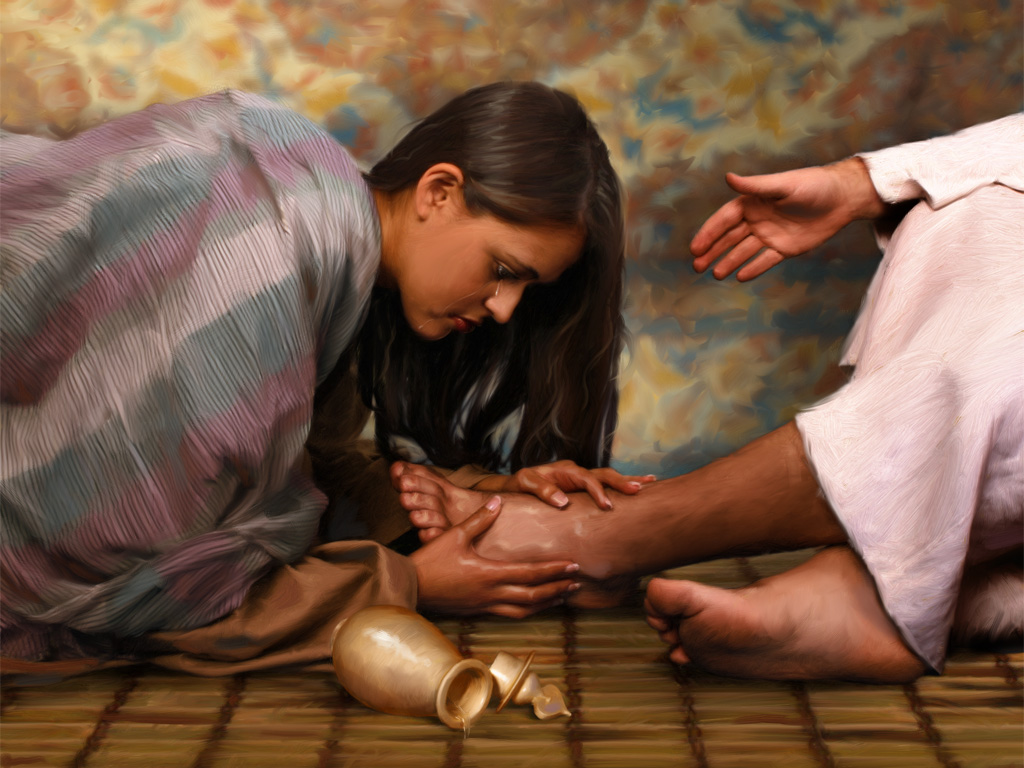– Dan DeVitis
Do You See This Woman?
An Object Lesson on Highest Worship
Immanuel Fellowship
Shippensburg, PA
Just who is this woman of Nain? Luke wrote about her in the seventh chapter of his Gospel. It is not the first woman mentioned whose son Jesus raised from the dead. It is the second woman, the one mentioned in Luke 7:36-50.
This woman has no identity. Bible scholars have not been able to creditably link her with any other named woman in the Bible. She was silent, never uttering a word. Seemingly someone obscure, one hidden in the shadows. The only thing noted to her was that she was a known sinner, most likely a town prostitute–someone unclean, a social outcast. It was what she did, how she did it, and why she did it that even to this hour speaks volumes of true worship in its highest form. O’ that we may learn from her.
A Pharisee named Simon invited Jesus to dinner and, as was the custom, the door of his home was left open so others wondering by were able to observe the meal, but not partake of it. Now this woman pressed in close behind Jesus as He sat at the table presumably with His feet behind Him as He leaned forward on to the table. What happened next is nothing short of miraculous—a divine revelation and encounter between this unclean sinner and the Son of God.
This encounter brings to mind the revelation given to Peter when he declared to Jesus, “You are the Christ, the Son of the living God.” To this confession Jesus replied, “flesh and blood did not reveal this to you, but My Father who is in heaven.” Mt. 15:16,17 Revelation! – an inward witness, knowing that you know that you know you are in the presence of the Christ, the Son of the living God.
This woman of Nain crouched down behind Jesus, and drew close. She knew she was not about to touch a great teacher, or a rabbi, or a prophet, but God Himself in flesh and blood. With all her heart, her mind, her soul, and all the focus of her whole being, she is totally convinced this is “the Christ, the Son of the Living God,” and she, the lowliest of sinners. This is her savior, her redeemer, her Lord her only hope in this world of darkness and despair. She is overwhelmed by the realization of it all and is broken in spirit before Him.
Here she is, an unclean sinner in all manner of life now thrust into contact with the Most Holy One of all eternity. O’ how she sobs and sobs and sobs as she grieves over the life she has lived. Tears of repentance and contrition fell like drops of rain upon her Savior’s feet. Such godly sorrow was producing repentance unto salvation. 2Cor. 7:10 It was not an audible voice of repentance, but a wrenching of the heart. She wept and wept pausing only briefly to unbraid her long hair and to dry His feet with it. This hair, which was once used to her glory, no longer had such value. It is now dedicated to her Lord’s use.
Words are often easy to say, with no real depth of meaning or intent. How could she convey her love, adoration and honor to Him?imHim? She began to silently kiss His feet. She could have perhaps more boldly stood and kissed His forehead, or His cheek. Or, perhaps she could have knelt and kissed His hand as the practice of many. But in all humility and brokenness she bent to the floor and kissed the least and the lowest—His feet. Not for a moment did she even raise her eyes to His face hoping to get a glimpse of acknowledgement or approval.
In her final act of worship, she took out a small flask of fragrant oil, which most likely wasis face.H previously used to make herself more appealing and alluring. And she poured this costly oil upon the feet of Jesus. Nothing “of-or-for” herself was of any value to this woman of Nain. The gains and rewards of this life were emptied out as fragrant oil anointing His feet.
This woman never said a word. She never said, “forgive me, a sinner.” She never said, “Lord, I love you.” She never expressed any needs, wants or desires. She simply worshipped with all her heart. For to this woman, worship was not about me, my needs or my blessings! It was all about Him and Him alone! All of her heart was directed outward and upward. Nothing was pleaded for downward and inward. She did not come to receive, but to bless. This woman was emptied out before the Lord. But, in all of this, there is actually a speaking and a hearing, although spirit-to-spirit. Jesus heard it all! Everything emptied of her heart Jesus heard loud and clear. How do I know? Read on.
Now the Pharisee who had invited Jesus to dinner thought to himself, “This man, if He were a prophet, would know who and what manner of woman this is who is touching Him, for she is a sinner.” But again Jesus heard this man’s heart, spirit-to-spirit. Jesus turned to the woman and said to Simon the Pharisee, “Do you see this woman? This Pharisee, this learned scholar of the Law, was about to learn an important lesson from this lowly woman of the street.
Jesus then began to explain how Simon cordially welcomed Him into his home for a meal, but “gave Me no water for My feet…gave Me no kiss…and did not anoint My head with oil.” And Jesus went on to say, but this woman, “washed My feet with her tears and wiped them with the hair of her head…has not ceased to kiss My feet since the time I came in…and has anointed My feet with fragrant oil.” Jesus then turns to this woman and says, “Your sins are forgiven!” Can you imagine, for just one second, how those words pierced to the heart of this woman, electrifying her whole being? 1
Now, you do remember that this woman of Nain never asked for her sins to be forgiven, or asked for anything for herself. She just worshipped in the purity of worship. It was with a broken spirit and broken and contrite heart. Perhaps there was a time to voice her needs in prayer and songs of petition. But this was not the time. This hour was totally for her Lord God and Savior Jesus Christ. This was a time of ministry solely unto her Lord and God. 2
Sometimes we have to ask ourselves, just where are our hearts and minds during such times of “worship?” We have to ask ourselves just where are we in relation to the presence of the Lord? We have to ask ourselves just what is the reality in which we are living and worshipping. Do we just join with others of a congregation to sing songs of praise hoping our voices rise in a pleasing manner before God’s throne as incense rises from a burning censor? Or, like this woman of Nain, somehow with our weakly voices giving way to the inward groanings of our hearts, and we see ourselves actually at the feet of the Son of God, in all His glory. Here, we worship Him in all adoration and thanksgiving in all humility and brokenness of spirit.
Do you see this woman? I pray God that I, and you, not just take note of her acts, but that God in His mercy and sovereignty reveal to our hearts and minds that we have come not just to stand in His presence before His throne in all spiritual reality, but we are about to touch the Christ, the Son of the Living God. This woman of Nain left Simon’s home a changed and different person. Amazing! A miracle! No one can worship in such a way and in such a presence and remain the same. Thank you Lord for the testimony of this woman of Nain.
Footnotes
1 Perhaps very important here is just how did Simon the Pharisee respond to this rebuke by the Lord. Was he offended and ashamed? Did he try to justify his actions? Did he seek out an “Admonition Support Group” to share with others the harshness of Jesus and His lack of understanding and His being so judgmental? Or, did Simon himself fall to the feet of Jesus, repent, and also find his sins forgiven? We all encounter admonition in our lives and how we respond to it may be life changing.
2 This account brings to mind a distinction in the priestly ministry described in the book of Ezekiel 44. The Levite priests who went astray were permitted to minister only to the people and their religious needs. But they were not permitted to minister directly to God. However, the Levites of the Sons of Zadok who were faithful and, “kept the charge of the sanctuary shall draw close to God, minister to God, and stand before Him offering sacrifices”.



